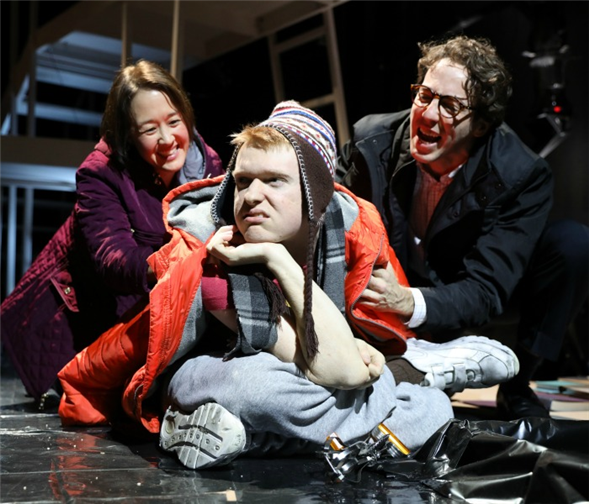Translate Page

In Uncommon Sense, Andrew Duff draws on his real-life experiences
---
Of the many breakups, breakdowns, and breakthroughs featured in Uncommon Sense, Tectonic Theater Project's new play about people on the autism spectrum, cast member Andrew Duff's favorite scene involves "Noodle Night." Dan, who's on the spectrum, invites Sarah, who has no official diagnosis, to dinner, but when he has trouble using his fork, she tosses hers away and they both dig in with their hands, feeding each other, getting wildly playful, and ending up in a kiss. "It's a moment of connecting and understanding without a need for words," says Duff. "They accept each other for the way they are."
Duff knows something about that having been diagnosed with autism at age two. In Uncommon Sense -- which threads together four narratives inspired by true stories of people living on the spectrum -- Duff plays Moose, a character who barely speaks and is often called disruptive. "Andrew's performance as Moose is quite honestly the most believable, authentic nonverbal autistic I've ever seen on stage or screen," says Andy Paris, the director and cowriter of Uncommon Sense. "When I was younger, I had Moose-like tendencies," Duff explains. "But now I don't."
Duff, 27 and a graduate of Bennington College, is articulate, outgoing, and unmannered, and "passes" (his word) as non-autistic. "I went through my whole life knowing this diagnosis was part of me, but not knowing what it really meant," he says. During his senior year, he wrote and performed in a one-man show exploring what autism meant to him. He put it on YouTube and Paris and his wife, Uncommon Sense cowriter Anushka Paris-Carter, came across it while doing research for their play. They were astonished.
"He told the story of not speaking until he was five-years old," Paris-Carter recalls. "And then when he finally spoke for the first time, in a tiny voice, instead of saying Mama or Dada, he said, 'Where are we now?'" Paris-Carter heard that and started crying. "It was a profound moment for me," she remembers. "Those of us who have autistic people in our lives are asking that very question. Where are we? What is autism? I can answer intellectually that it's a collection of behaviors and challenges, but that doesn't tell you about any specific person you meet." As a character in the play says, "We're like stars: no two alike."
The creators brought Duff on board and he's been with the piece throughout much of its development, including its world premiere at the University of Northern Iowa this past January. He is the only actor of the eight-member cast on the spectrum and serves as a resource for everyone involved.
Tectonic Theater Project was cofounded by Tony-nominated playwright and director Moisés Kaufman in 1991, and its best-known works The Laramie Project, Gross Indecency: The Three Trials of Oscar Wilde, and I Am My Own Wife were based on specific individuals and events. Uncommon Sense is a bit different in that hundreds of people's experiences helped shape the show. Each story revolves around a composite character on the spectrum. Dan (played by Scott Barrow) is intelligent and employed, but unusually literal minded and socially awkward. Jess (Jessica Almasy) is a brilliant student and video-game enthusiast, but also a loner who can't read people's facial expressions. Lali (Jill Frutkin) is nonverbal, obsessed with rice, and wears a helmet. And Duff's Moose needs the most support of all. These characters' interactions (or lack thereof) with non-autistic people comprise the show, which uses video projections, effects, and stagecraft in order, as Paris says, "To allow an audience collectively to see and hear and feel a little bit of what someone on the spectrum may see and hear and feel."
For example, after being captivated by jellyfish at the aquarium, Moose throws around his laundry in order to recreate the sea creatures. His mother just sees an inexplicable mess, but the audience recognizes its beauty through Moose's eyes. That scene is Duff's second favorite in the play, and he considers Moose the show's most interesting character. "He is very much his own person," Duff says. "He has more awareness of his surroundings than people give him credit for."
And while Duff admits he identifies more with Dan -- "He's is a happy-go-lucky guy who tries to be friendly, but sometimes doesn't quite get it" -- he says that "in some ways, I relate to all the characters." That they are so different from each other is one of the reasons Duff is proud to be a part of Uncommon Sense. "This play has a spectrum of people on the spectrum," he says. "It's pretty rare to see that."
Learn about TDF's Autism Theatre Initiative, which helps make theatre accessible to individuals with autism.
---
TDF MEMBERS: At press time, discount tickets were available for Uncommon Sense. Go here to browse our current offers.
Jonathan Mandell is a drama critic and journalist based in New York. Visit his blog at NewYorkTheater.me or follow him on Twitter at @NewYorkTheater. Follow TDF at @TDFNYC.
Top image: Michi Barall, Andrew Duff, and Brian Hastert. Photos by Joan Marcus.